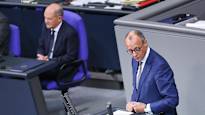The German government crisis can also have three good sides.
Anna KarismoEurope correspondent
BERLIN When the German government is a lame duck, a power vacuum is created in Europe.
We are in such a situation now. Germany is the largest country and the largest economy in Europe. The EU cannot revive its economy or improve its security unless Germany is involved and loosens its purse strings.
For the next three months, the Chancellor of Germany By Olaf Scholz his hands are tied because he does not have a majority in parliament.
In addition, he himself has to spend the rest of his term in election campaigning, and European issues are not at the top of voters’ minds now.
In Germany, with this information, early elections will only be held at the end of February. By then, the new president of the United States Donald Trump has been sitting in his post for a month already.
More on the topic: The expert tells what kind of effects the German government crisis can have on Finland.
Support for Ukraine is faltering
Especially from the point of view of Ukraine, Germany’s ferment could have serious consequences in the coming months.
In the worst case scenario, the Trump administration will cut aid to Ukraine to almost zero. It would increase the pressure on EU countries and Germany to come to an emergency.
The majority of the German parliament does support supporting Ukraine, but in the current political situation granting additional support is practically impossible.
Scholz’s government decided to also postpone the decisions on Germany’s next year’s budget to next year. For example, it is pointless to talk about taking on debt in favor of Ukraine before the elections, because according to polls, the majority of Germans would like to reduce Ukraine’s support.
The edges are rising
Based on the polls, the opposition party Christian Democrats, or CDU, is emerging as the largest party.
The extreme parties are also clearly growing. According to opinion polls, Scholz’s Democrats, or SPD, only fall to third place, behind the Alternative for Germany party, or AfD, which is partly classified as far-right.
Both the AfD and the far left Sahra Wagenknecht the party BSW would stop supporting Ukraine and transfer money to Germany’s own economy.
The growth of these extreme parties is one of the reasons why Scholz did not want to hold new elections right away, but only next year. He still wants to pass laws so that authoritarian parties do not succeed in undermining democracy.
The purpose is, for example, to anchor the country’s influential constitutional court more firmly in the constitution, so that fringe parties cannot block decisions there. According to the current law, a minority of one third of the Bundestag could block the court’s activities.
Scholz’s government would also like to enshrine the so-called Deutschlandticket, i.e. a travel ticket for public transport throughout Germany, into law.
Three silver rims
There are also silver linings in holding new elections.
The German economy may gain new strength after the elections. The strongest candidate for chancellor, CDU Friedrich Merz namely quoth on Wednesday that he was ready to consider changing Germany’s debt brake.
A change of government can also have good effects for Ukraine after the elections. Merz has been more open than Scholz about giving Ukraine long-range Taurus missiles, for example.
Merz may also seek closer cooperation with Scholz, another large EU country, France. He has met the president Emmanuel Macron also between two people, even though he is the leader of the opposition.
The relationship between Germany and France has practically been in the dock for the last few years. You can read about it in ‘s previous articles here, here and here.
